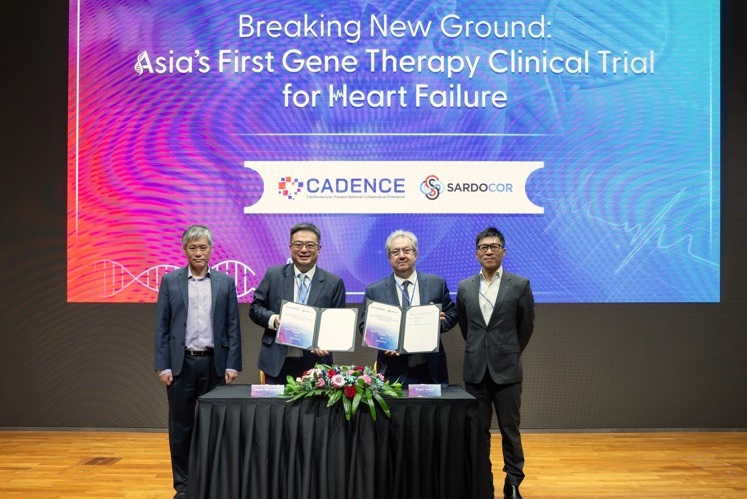
Photo credit: Consortium for Clinical Research and Innovation, Singapore (CRIS)
The Cardiovascular Disease National Collaborative Enterprise (CADENCE) and Medera Inc. (“Merdera”)’s Sardocor have initiated a ground-breaking clinical trial for a novel gene therapy product aimed at treating heart failure. This marks the first multi-centre gene therapy trial in Asia for heart failure, with Singapore being the first and only site selected outside of the United States (US) for this significant translational breakthrough.
Heart failure is a global challenge, with Singapore facing a particularly high burden. About 2.5% of Singaporeans aged 60 years old or above have heart failure. The condition is often the result of ischaemic heart disease, which contributes to around 20% of deaths in Singapore. Southeast Asian patients tend to present with heart failure at a younger age (mean age of 54 years) than those in theWestern population (mean age of 75 years). Furthermore, they tend to present with more severe conditions which require intensive care, longer length of hospital stay, and a higher hospital mortality rate.
Developed by Medera’s solely owned subsidiary Sardocor, the gene therapy product SRD-001 can potentially improve the pumping action of the heart muscle, reduce symptoms and signs of heart failure, and reduce the risk of hospital re-admissions. SRD-001 is intended to treat patients with heart failure with reduced ejection fraction (HFrEF), a prevalent form of heart disease that accounts for half of all heart failure cases worldwide.
Having received an Investigational New Drug (IND) clearance from the US Food and Drug Administration (FDA), SRD-001 (NCT0470384), phase 1/2a is expected to complete its enrolment, followed by an interim data readout and the randomised Phase 2b in 2025.
Medera’s Sardocor has also obtained IND clearances as well as Fast Track Designation (SRD-002; NCT06061549) from the US Food and Drug Administration (FDA) for HFpEF and orphan Drug Designation (SRD-003; NCT0622466) for their gene therapy trial in patients with Duchenne cardiomyopathy, highlighting its potential as a new first-in-human treatment option for patients afflicted with different types of HF. SRD-001/2/3 employs an adeno-associated virus-based gene therapy, delivered directly to cardiac ventricular muscle cells via Sardocor’s proprietary intracoronary infusion system.
Furthermore, clinical dosages have been optimised by the Human mini-Heart® technology developed by Novoheart, another solely owned subsidiary of Medera, in accordance with the FDA Modernisation Act 2.0. On 21 November 2023, the National Heart Centre Singapore (NHCS) announced a partnership with Novoheart to develop Asia’s first bioengineered human heart-in-a-jar with heart failure for precision medicine.
This trial marks the first collaboration between Singapore's two national heart centres (NHCS and NUHCS), and with TTSH. This is a testament to the country’s robust cardiovascular research infrastructure. It also highlights CADENCE’s efforts in streamlining clinical trial processes across these institutions. This includes streamlining contracting procedures, simplifying the costs of conducting cardiovascular clinical trials across these sites, as well as providing a centralised point- of-contact for companies looking to conduct clinical trials and bring novel therapies to Singapore.
Professor Roger Hajjar, MD, President and co-founder of Medera, expressed enthusiasm about the trial's launch: "Medera and Sardocor are very excited to initiate this trial in Singapore, the first site outside of the US, by deploying this cutting-edge technology for the first time ever to Asian heart failure patients. Sardocor’s unique regulated intracoronary delivery methodology is a minimally invasive procedure that targets the heart directly, designed to minimise drug dosage and therefore side-effects while preserving efficacy. While the Singapore trial’s initial focus is on congestive heart failure, this foundation will enable subsequent expansion to other cardiac indications."
Adding to the significance of this trial, Professor Derek Hausenloy, Executive Director of CADENCE, and Director of the National Heart Research Institute Singapore at NHCS, remarked, "The launch of the SRD-001 trial in Singapore is a landmark moment for cardiovascular cell and gene therapy research in Asia. It underscores our commitment to integrate cutting-edge research and technologies to combat cardiovascular diseases. By bringing together the best of our national research capabilities and expertise, we aim to pave the way for innovative treatments that can significantly improve patient outcomes. This trial not only highlights Singapore’s position as a leader in cardiovascular research but also showcases our potential to contribute to the global fight against heart failure."
“Medera is extremely delighted to partner with Singapore’s cardiac experts from the public healthcare institutions in its first efforts in Asia to comprehensively cover important areas from mini-Heart®- based drug discovery all the way to clinical gene therapy starting with SRD-001 for the benefit of the large number of Asian heart patients,” said Professor Ronald Li, PhD, CEO and co-founder of Medera.
Photo caption: Prof Derek Hausenloy, Executive Director of CADENCE and Prof Roger Hajjar MD, President and co-founder of Medera, signed a Memorandum of Understanding (MoU) agreement to collaborate on Asia’s first multi-centre gene therapy clinical trial for heart failure.
(From L to R)




